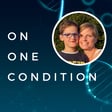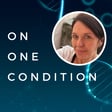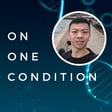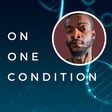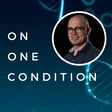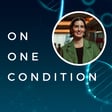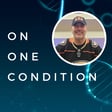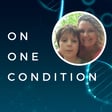Become a Creator today!Start creating today - Share your story with the world!
Start for free
00:00:00
00:00:01

Episode 37: Dionne Stalling - SBS & PPPD
In this 2-part series with Dionne Stalling, we focus on four of the nine conditions that affect her.
In part 2, we talk about short bowel syndrome (SBS) and persistent postural perceptual dizziness (PPPD). Beyond discussing the symptoms and how the conditions affect Dionne, we address some important topics in this episode, such as the continuous fight to increase the breadth of what is covered by newborn screening, the challenges of having a restrictive diet and the under-representation of minorities in clinical trials.
The song that Dionne chose for this episode is Easy by The Commodores.
Transcript
Introduction to Discussion
00:00:00
Speaker
Hi, I'm Silvan Bertolo, and you're listening to On One Condition, a podcast to raise awareness about health conditions by listening to people who leave them every day. Today, I have the pleasure of welcoming back Dion Stirling, and we're going to talk about Schott-Bauer syndrome, which we didn't have time to talk about for our last episode. And we're also going to talk about persistent postural perceptual dizziness.
00:00:29
Speaker
Hi, Dion. Thanks for coming back. How are you doing today?
00:00:33
Speaker
I'm well, Sylvan. Thank you for having me back. It's such a pleasure. Too bad I had too many issues to talk into one episode, but I'm glad to be here. Thank you. Well, I'm glad you're coming back. I'm sure our listeners will be as well because it was very interesting last time. And as
Musical Preferences as Personality Reflection
00:00:52
Speaker
you're coming for a second time, you get to choose a second song. So what's your second favorite song and why?
00:01:01
Speaker
My second song is Easy by the Commodores. I always wanted the Commodores to get back together. But that is one of my favorite songs. The lyrics and Sunday mornings are easy for most people. That's the day that a lot of people reset. Some people go to church. Some people relax. It sets the tone for the next week.
00:01:24
Speaker
Yes. And I've heard you tell me that you're easy like a Sunday morning and that the song could define you. So that's great to hear. I'd love to have like a song title that I could use to share with people who I am.
Living with Short Bowel Syndrome
00:01:43
Speaker
Right. So let's start with short bowel syndrome. Last time we didn't have time to talk about it. How did you realize that you have short bowel syndrome?
00:01:54
Speaker
Because of chronic infections and multiple abdominal surgeries, I've been opened up over 10 times in my abdomen. I had two C-sections with my children. I have myomectomies, which is the removal of fibroid tumors in the uterus. And so what happens is when air hits your abdomen and you have abdominal surgery, a lot of times, a lot of people get what they call abdominal adhesions.
00:02:24
Speaker
to describe it like my surgeon described it to me is basically like cement or having saran wrap. And what happened was when I had staff and MERSA and they got me cured from that, when the doctors went in, when we went into surgery, it was exploratory, but they also knew that one thing that they were going to do for sure.
00:02:47
Speaker
but they didn't know what else they were going to face. And so the first colon resection, I had several feet of my small intestine removed.
00:02:58
Speaker
And then I had issues with food then, but it wasn't, it wasn't enough removal to be short bowel syndrome, but 10 years to the date, almost. I had the same exact surgery on opposite ends of my abdomen. And they also took out several feet of my small intestine and the ilium part of the digestive system or the digestive tract. And because of that.
00:03:24
Speaker
that made me go into short bowel syndrome. The adhesions had stuck.
00:03:31
Speaker
to my colon and some other organs. And they couldn't do everything, my bladder, all kinds of things. And so the removal of that caused me to have short bowel syndrome. And that's the one thing that has been the hardest, especially when you have lived your whole life loving food, trying different cuisines, all kinds of food. I've never had a dietary restriction.
00:04:00
Speaker
that is what's affected me the most and that has had the most impact on my life. So does that mean that you can't eat certain foods or is it that you can't eat too much of certain foods?
Managing Unpredictable Symptoms
00:04:15
Speaker
For me, everyone with short bowel syndrome is different. I'm learning. Some people were born with it and they wear elastomy bags or ostomy bags. I'm not sure the difference between the two, but they wear bags.
00:04:29
Speaker
And some people get their food through a feeding tube. I'm lucky that I don't have to do that. It could be anything. I could eat four grapes and be in the bathroom literally all day from eating those four grapes. Luckily I'm on some medication now that is helping me manage it so I don't go to the bathroom as much, but it could be anything. And I've tried.
00:04:52
Speaker
a low residue diet, I've done liquefy. It just depends on the day. And I don't know if there's something else going on because when you are chronically ill like me, you don't run to the doc. I don't run to the doctor a lot because I get tired because it's always something, right? But it's hard because a lot of people celebrate things and events and people through food.
00:05:18
Speaker
It's hard when I go out to eat because, and it's funny, I want to tell you this story. I went out to eat with a group of friends. I didn't order anything. I just ordered, I think a Sprite or some kind of soft drink. One of my friends slid me a note and said, I'll pay for your food. And it wasn't that I couldn't afford my food is I can't eat it.
00:05:39
Speaker
So whether, I mean, worth the food, but she noticed that, you know, you're in a group of like 12 people and everybody, there's food all around, but I knew that I wouldn't be able to eat. So yeah, it's been a huge adjustment because I got diagnosed with short bowel syndrome right at my 50th birthday. So I've been living with it for almost five years, but I went 49 whole years of loving cooking and eating food.
00:06:09
Speaker
Yeah, and it's awkward, especially socially, like you said, when you can't eat everything, when you can't eat like everyone or at the same time as everyone, it raises questions. I know, like myself, I have a condition that limits what I can eat as well, not as much as your condition, but I know that it raises questions and you don't necessarily want to have to justify yourself.
00:06:37
Speaker
So yeah, I fully get why it's difficult. Is it something that could get better over time or not? My gastroenterologist said probably not. The thing about it is they didn't take all that they should have.
00:06:56
Speaker
The surgeon was like, your quality of life would have diminished tremendously if I had taken more. And also the adhesions were surrounding my liver and my bladder too. And at this point, I don't even know, even if it was life or death, I don't think that I would ever go through another abdominal surgery again because
00:07:16
Speaker
of fear of infection and having to go back into the hospital to get that infection, to have another wound back or a packing of my abdomen with gauze and things like that. I don't think that I'll ever, at this age, and even though I'm only 54, I don't think that I would be okay with having another abdominal surgery.
00:07:39
Speaker
Okay. And is there any link between Schumpel syndrome and persistent postural perceptual dizziness or not?
Anxiety's Role in Dizziness
00:07:50
Speaker
I'm not going to say this for me, this is just my experience and everything that I'm speaking on is my experience. Persistent postural, perceptive dizziness is a vestibular disorder. It's like you feel not steady on your feet and it's most times
00:08:10
Speaker
it masks itself as or it presents itself as like you're having about a vertigo, right? You're dizzy. For me, the room gets dark and I'm perfectly coherent. I know what's going on around me, but the room will get dark like a slow kind of like a light having a dimmer and I get really dizzy and lightheaded and
00:08:34
Speaker
they're connected for me because if I get really bad anxiety in a restaurant or I'm having really bad anxiety around eating something and or if I'm having an episode where I have severe diarrhea and I'm anxious about it, what I'm finding is that I have more episodes.
00:08:58
Speaker
I believe a combination of all of these chronic illnesses and the PTSD behind them, the trauma behind it, triggered Triple PD.
00:09:10
Speaker
while most people with chronic illnesses have some form of mental illness, I'll call it illness because it's not no stigma attached either depression or generalized anxiety disorder or something. Most of us have it, especially if you've been sick for a very long time and if you've been sick going through a health system that hasn't paid attention to you.
00:09:32
Speaker
So I can say that afterwards, when I got that, it was a combination of things. My son was in the military and his ship was deployed and his ship had the sailors with COVID on it. And that's like was the pinnacle of everything coming to a head. Plus I was dealing with the short bowel syndrome being newly diagnosed, running back and forth to the doctor. And then during COVID it got worse.
00:10:00
Speaker
Okay. You mentioned that it's a vestibular condition. So physical, but it sounds like it's very heavily influenced by your anxiety. So that's, that's usually health component. Yeah.
00:10:21
Speaker
My neurotologist, so the doctors that treat you for this are neurotologists, which are ENT doctors that I think have done a fellowship or some type of advanced training in the neurology space. And what he told me was that it's triggered by an event, which was my sonship being out in the middle of the ocean when we didn't know what COVID was, right? It's basically a panic attack with dizziness.
00:10:51
Speaker
And for me, sometimes the room goes dark. And I don't know, most people that have panic attacks never describe the room going dark, but for me, the room goes dark. And the problem is now, if I'm overstimulated, that's a trigger for me. If I'm overstimulated, if I go to a mall or a restaurant, that's too loud. The bad part about it is that there's no cure for it. And the only treatment.
00:11:18
Speaker
is
Therapeutic Management Strategies
00:11:19
Speaker
vestibular physical therapy to help you with your balance and cognitive behavioral therapy. Wow. Are you going through those therapies or not? I stopped going to vestibular physical therapy out of just sheer frustration
00:11:37
Speaker
It was helping certain things, but I still couldn't walk in a straight line with my eyes closed. It helps you a lot. They put you in this machine or put a harness on you and you do exercises to help you with the uneasiness because they don't want you to be a fall risk. It helps you with your balance a lot, but I do, I go to therapy every week. Okay.
00:12:00
Speaker
What my physical therapist told me was that if I ever feel like I am walking and I'm going to fall and it happens more than twice in a day to come back, it's just that I was going often and I didn't feel like it was working fast enough, which is my fault. I don't advise anybody to do that. I just had a lot of things going on at one time and I just let them go by the wayside.
00:12:25
Speaker
Yeah, like you said earlier, you have a lot of visits to doctors already. Does it limit what you can do then where you can go or even limit your ability to drive?
00:12:39
Speaker
No, it doesn't necessarily limit me. What I've learned in therapy are different coping mechanisms. Like if I find that I'm somewhere and I start to feel dizzy or uneasy on my feet, I try to, you know, count how many doors. I forgot what it's called in therapy. There is a special name for it. You concentrate on everything that's read in the room or
00:13:06
Speaker
how many men are in the room or to get your mind off of what's going on to focus on what that is. And that helps a lot. Okay. So is that something you can feel coming and manage if you feel like you're going to have an event? Yeah, I can usually tell. I may either feel lightheaded or nauseous.
00:13:34
Speaker
This is the best analogy. If you're on a ship and you feel nauseous, that's how it feels. It's like you're dizzy in your body and your stomach starts to act up. Yeah. Okay. So for this, do you have any hope of it getting better over time? Yeah, I believe so. I went through training
00:13:58
Speaker
maybe a year and a half ago to be a breathwork coach because breathwork helps me a lot. Because I used to tell my daughter all the time, and I've always done it, if I'm having a rough day, like take a deep breath, but I never knew the science behind it. And so when I found out about training, of course, because I'm a natural, I'm curious by nature,
00:14:26
Speaker
that I wanted to see what the science was behind it and what other breathing exercises and techniques could I implement. So it helps a lot, but sometimes you forget it, right? You're out with friends or you're walking through a mall and something comes over you and you don't really remember it. So breathing helps me a lot. I try to do breath work sessions with myself at least two or three times a week.
00:14:55
Speaker
And I found that that has helped a lot. Could you tell us a bit more about breath work? So what do you call a session of breath work? It is basically breathing exercises for certain things, right? So that you may have breathing exercises to calm anxiety and it's all controlled.
00:15:20
Speaker
The practice of breath work is simply controlling your breath to get to a state of relaxation. Now, breath work isn't good for everybody because some people with certain illnesses like certain heart illnesses shouldn't do it or they should go to someone that
00:15:38
Speaker
you know, knows exactly what they're doing. But I was trying to figure out what I could do besides take pills. And because breath work is thousands of years old, and it's a practice in Eastern medicine for many years, I was trying to find other things. And so there's breath work exercises for
00:16:04
Speaker
like belly breathing exercises that you can do to be able to help you with digestion and things that you can do to increase your cortisol. Breathing exercises to manage your stress and it lowers your heart, which is that's why I said sometimes it's not good for people with heart illnesses, especially if you're on heart medications.
00:16:26
Speaker
But yeah, it's helped me tremendously. Also, what I was told when I was going through my training is that when people have abdominal surgery, breath work is really good to help them strengthen their abdominal muscles, especially if you've gotten cut vertically across them down the muscle. Those type of those are one of the benefits as well.
00:16:51
Speaker
Sometimes it increases. Sometimes, Sylvan, it makes me feel, depending on the type of exercise I'm doing, I get more energy. Okay. That's fascinating.
Breathwork and Post-Surgery Recovery
00:17:05
Speaker
I have read about breathing exercises and I've never really applied it myself. It really makes me want to look into it more.
00:17:14
Speaker
But I guess going back to what you said, to start with on breath work, you exercise regularly. So I guess that's something you need to practice regularly for it to become more natural. Is that it? Yes. Yes, I should. I should do that because I don't. The thing is, you're talking about regular exercise or when you said exercise.
00:17:38
Speaker
Like I don't exercise. I need to, and I know that I do, but breath work, I do need to do at least, I need to, the goal was after I finished my training was to do it five days a week. And I just, I've just failed to do it. It's no reason, no, I don't have an excuse. I just haven't done it. And so now that I'm speaking to you, I'm going to put it, if I put it in my calendar, it will happen.
00:18:03
Speaker
If I put it in my phone or on my calendar, it will happen. So I need to do that because I honestly need it.
00:18:12
Speaker
Yeah. Well, that's very interesting. And thank you for sharing about breath work. That's something we haven't really talked about on the podcast yet. But now I'd like to shift back to a topic we addressed last time, but not fully, which is patient advocacy. And I want to start with a relatively broad question. What do you want to achieve through being a patient advocate?
Patient Advocacy Goals
00:18:43
Speaker
my goal as a patient advocate to make sure that people get diagnosed sooner, that they are able to access the treatments that they need when they do get diagnosed, and understand their illnesses on multiple levels, not just the diagnosis, but to know
00:19:11
Speaker
all the things that
00:19:14
Speaker
may happen while dealing with that rare disease. And what I'm finding is that rare disease advocacy and just regular advocacy overlap, but rare disease advocacy has certain nuances to them that other illnesses don't. There are over 10,000 rare diseases. Some of them don't even have names. And we call those ultra rare.
00:19:42
Speaker
and they have varying needs on a pediatric level, adolescent, young adult, and geriatric. What I strive to do is to, with the advisory voice that I sit on and the work groups that I'm in, to make sure that the patient's voice is
00:20:10
Speaker
first and foremost in any type of study policy procedure that they understand that whoever I'm speaking to or whatever I'm trying to achieve that those people that are in a decision making capacity understand the position of the patient and things that they may not have thought of.
00:20:34
Speaker
Is it something that you see evolving in a good way? Because that's what I feel, that there is more attention to bringing patients into the research early on. But I don't know if I'm biased because of the contacts I have on LinkedIn or not. So from your point of view, do you see an evolution here?
00:20:59
Speaker
I do. It's moving. It's moving. It's not like it was when I first started advocating 10 years ago. It's come a long way. But we also have a very long way to go. And that's what I am trying to do with Rare and Black because I don't know how they run studies in where you are in the UK, but I know that here in the United States, their research needs to look like America. Yeah.
00:21:29
Speaker
their Black people are not privy or educated enough on research and different treatments. There is a huge mistrust and also Indigenous and tribal nations also have it really hard
00:21:50
Speaker
Mm-hmm and not being thought of because I'm not sure every time I say this to someone they're fascinated I was fascinated when I heard this this too that some individuals that are a part of tribal nations Don't speak or write English So therefore they can't give written consent to be part of studies and until
00:22:15
Speaker
the NIH in this country recognizes that and makes that policy possible to eradicate English written consent, then we're always gonna be behind the A-ball. But I do believe that is slowly improving. And as people do more advocacy on every level, not just patient organizations, but physicians and geneticists and researchers,
00:22:43
Speaker
are looking to be more educated and understand that the fabric of this country is vast and diverse, just like I can't speak for all Black people because we're not a monolith. We have wealthy Black people and we have poor Black people.
00:23:03
Speaker
are impoverished. So just understanding that helps, but it is improving. I've seen an improvement, not as much as I would like, but we're moving the needle. We were slowly kicking the ball slowly. Yes. And I mean, it's good to see progress. Unfortunately, our industry moves relatively slowly, but it's good to hear that you see progress and it's going in the right direction.
00:23:33
Speaker
Yeah, but you know what? Why does it have to take so long? You see how quickly we got a vaccine for COVID? That didn't take long. Like, I don't understand why things take so long.
00:23:46
Speaker
I'd love to have an answer to this. Anyway, if I had an answer, I would feel empowered to do something about it. Yeah, it was just a question for your listeners, because if we all could get together and just make things happen,
00:24:05
Speaker
Yeah, I agree. So you talked about early diagnosis as one of your objectives through patient advocacy. And last time you mentioned newborn screening. And I recently discovered that newborn screening is depending on the state in the United States. Is that right?
Standardizing Newborn Screening
00:24:34
Speaker
Yeah, it depends on. So newborn screening is a testing that is given to children in the United States at birth. Right. And there is a federal board that votes on what's going to be on the rust list, which is the recommended uniform screening panel.
00:24:57
Speaker
And then the states decide which of those conditions they're going to put on. Now in a perfect world, I would love, and most newborn screening advocates would wish that every, that we had a federal mandate that all states follow to test for every condition that's on the rust list. What you find is states will say we can't afford
00:25:23
Speaker
the testing for all of those. Like the state that I live in, I live in Missouri, we test for 62 different illnesses or conditions where in, let's say, Louisiana, I think there are 34, 35 conditions. So you see how significantly less it is.
00:25:44
Speaker
But Louisiana is quote unquote a poor, not tax rich state. And so they test for less things. And it doesn't mean that it's not needed. States say that they just don't have the money. And so if we had a federal mandate, maybe federal appropriation or federal funds could be designated specifically for that.
00:26:08
Speaker
I see. Thank you, because I didn't realize what was the context behind it. So does it mean that if you want to increase the breadth of newborn screening, do you have to focus on each state individually or do you have to approach the federal government?
00:26:36
Speaker
We've done both, but what most advocates have found most effective is going from state to state. Because you run into walls with the federal government saying, that's just too costly, it's too this, it's too that.
00:26:54
Speaker
What we found is you make a bigger impact. Like I said, we were small, slowly moving the ball. That's what I mean. Tackling state by state because like California, they test for 64 conditions.
00:27:07
Speaker
So I think you get more done. At state level, yeah. Yeah, because then you have specific advocates for specific conditions like crab A or Duchenne that can go and tell this state, you're not currently testing for this. This is affecting our constituency, which you can do this on a state level. So I think it's more impactful to do it by state because
00:27:35
Speaker
Federal government, to be honest, is not doing nearly what they should be doing as fast as they should.
00:27:43
Speaker
Yeah, it sounds like a tough task. But at the same time, I've heard a few of my guests talking about newborn screening being an area of focus for them. So it sounds like there's more of an army behind it than just a single person trying to tackle it.
00:28:10
Speaker
There are a lot of us and any advocate, especially something that is genetic, that can be treated, because all of us know early diagnosis makes the quality of life better for everybody, right? Because things that go untreated like me end up giving you other conditions that sometimes can be worse than what you actually should have gotten diagnosed with.
00:28:37
Speaker
in the beginning, it makes your life worse. So if you're an advocate, especially in something that's genetic or the rare disease space, there are a lot of us out here pushing for better newborn screening, better procedures, and trying to get more conditions tested.
00:28:57
Speaker
Well, yes, and there are conditions where science is making progress, but unless a treatment is applied early on in the person's life, it's not going to have as good an impact. I'm thinking about the progress we're seeing with Juchen, for example.
00:29:20
Speaker
That makes sense. Is there anything else you want to add about patient advocacy and what you want to achieve? I just
Advocacy Beyond Government
00:29:32
Speaker
want to be able to make people's lives better. I don't want anybody to ever have to go through what I've gone through. And for me, advocacy is not just government.
00:29:47
Speaker
It is talking to the C-suite and hospital settings, letting executives know how their decisions affect the physicians that care for us and how we can all have more optimal health. It's unfortunate that people actually pass away because of bureaucracy and policies.
00:30:11
Speaker
that really don't have to be, and then there's so much waste at the same time. So being able to bring that to their attention, because I'm not going to assume that everybody knows. And that's all I can do is educate and make the powers that be aware. And I think that's the assignment that God gave me, and I'm going to do what I can.
00:30:38
Speaker
Well, that's a wonderful assignment, a wonderful thing to focus on and perfect way to finish this podcast, I think.
00:30:50
Speaker
It's been amazing talking to you, Dion. I've learned so much just within half an hour. And I'm sure we've only scraped the surface of what you do and what you know and how you're trying to make this world a better place. So thank you so much for taking the time. It's been an absolute pleasure.
00:31:16
Speaker
And I've already asked you what your happy place is. I'm going to ask you a different question this time. When you
Future Aspirations and Gratitude
00:31:25
Speaker
think about the future, and not too long in the future, but maybe in the next five years, what would make you happy? What would you like to see?
00:31:37
Speaker
Oh my goodness. I would love to see people not having, this is my advocacy hat, not having to jump through loops or get on their deathbed with fighting to get treatment. And on a personal level, I would love to see grandchildren.
00:32:02
Speaker
Well, for the personal level one, that's amazing. And I wish you that for the patient advocacy one, I fully agree. And that's one of the reasons why I'm doing this podcast. So I'd love to see that as well.
00:32:18
Speaker
Yeah. And your podcast is really informative and it gives perspectives. And I thank you for having me. It's been an honor that you reached out to me and I'm so glad that we got to connect. Hope to see you sometime in the future when I make my way to Europe or you make your way to the US. Oh, me too. It's been a honor as well. So thank you very much.



